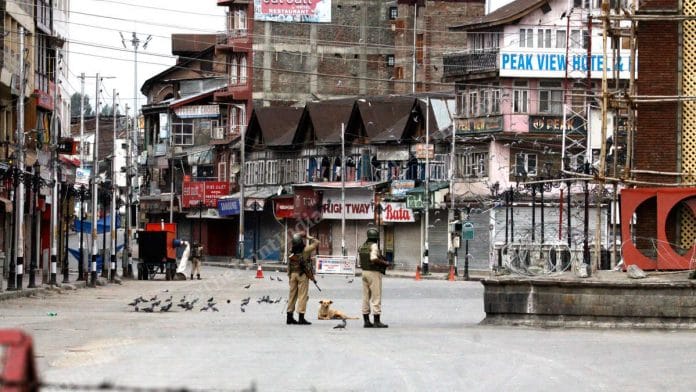New Delhi: It becomes difficult to “set the clock back” if there is “considerable delay” in the disposal of a petition, senior advocate Arvind Datar said Friday. Datar was speaking in the context of petitions against the abrogation of Article 370 pending in the Supreme Court at a panel discussion held on the launch of a digital book ‘Hamin Ast? A Biography of Article 370’, by Navi Books.
Navi books is an open access digital book publishing platform of Vidhi Centre for Legal Policy.
The other panelists who participated in the short discussion that followed the launch were former Chief Information Commissioner Wajahat Habibullah and Mridu Rai, author and professor, Presidency University, Kolkata.
Vidhi’s founder director Araghya Sengupta moderated the panel discussion.
The book’s launch coincides with the third anniversary of the abrogation of Article 370 — the constitutional provision that conferred special status on the erstwhile state of Jammu and Kashmir — by the ruling Bharatiya Janata Party government. After its scrapping in 2019, J&K was stripped of its statehood and divided into two Union Territories — J&K and UT of Ladakh.
Datar made his remarks when Rai, speaking on the abrogation and how it has left the Valley residents “frightened”, wondered if the top court would “try to turn back the clock” by setting aside the abrogation.
In his response to Rai’s concerns and also queries from the participants, Datar said: “Suppose there is considerable delay in the filing of the petition and the ultimate disposal, then it just becomes difficult if not impossible to set the clock back. You can perhaps do it technically but how far can it be done practically is a question.”
Also Read: Before Art 370, Nehru was ‘irritated’ by Sheikh Abdullah’s Kashmir interview
Constitutional or unconstitutional
Datar further explained that “rolling back” an executive decision becomes more and more difficult as the years go by, not just in the context of Article 370 but other sensitive issues as well.
On whether the manner of the Article’s nullification was constitutionally sound or offended its spirit, Datar said: “There could be different means of achieving an end. I frankly do not see any unconstitutionality. The constituent assembly went off. Now suppose you want to operate, once the Assembly goes, then there is no question of getting consent.”
According to Datar, although the abrogation could have been done differently, there was nothing illegal about the way it was done. “The Constitution of J&K was dissolved, so I do not see how the deletion of the amendment to Article 370 really brought any cataclymactic (sic) change,” he said.
Scholars, he said, may have seen the drafting of Article 370 as asymmetric federalism, but with time, a series of orders were passed that substantially removed the asymmetry.
Habibullah shared a divergent view on this. Even though the former CIC — who served as a bureaucrat in the Valley when the separatist movement was at its peak — accepted Article 370 was an “irritant” as it denied benefits to J&K residents that were granted to other state residents, he said that the abrogation should have followed a consultative process with the people.
“Article 370 in actual facts was more aggressive than the developments which were taken place in India. There was no need for Article 370, but you should have had debates on it to find easy ways to get over it,” Habibullah said.
Rai expressed his apprehension over the fear that has settled in the minds of the Valley residents after the abrogation and the new laws that have become effective there. This has raised the suspicion of many Kashmiris, she said, and it’s time that they are heard and consulted.
(Edited by Uttara Ramaswamy)
Also Read: When it comes to Kashmir and Article 370, the axe forgets but the tree remembers






